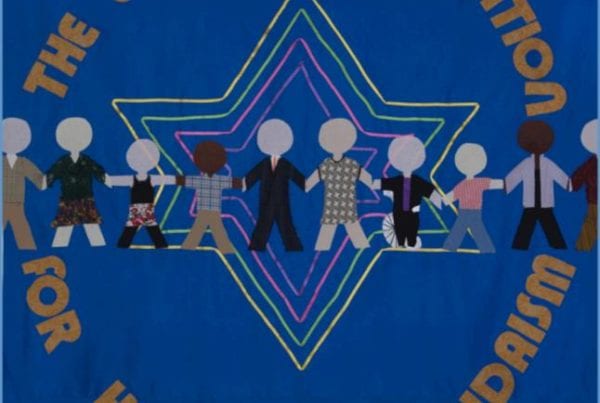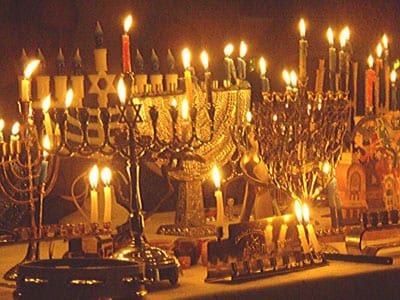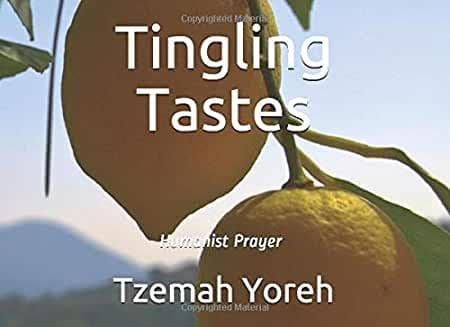Outside and Inside
Ernie Rubinstein
Rosh Hashanah, September 30, 2019
On Feb. 10, 2008, at the age of 56, I learned something new about myself. I learned I had a sister I never knew I had. My sister Madeleine is English, born and bred. She was born in the stellar year of the Prague Spring, the then college student uprisings, and the opening of the musical Hair on Broadway: 1968. She lives in a section of London called Putney. A Francophile, she until recently taught French in London’s elementary schools. She is married to a handsome Japanese man. She has two beautiful children, Nicholas and Emily.
Madeleine and I share a father, but not our mothers. I won’t dilate on the complexities of my parents’ marriage. They are deceased. They are both precious in my memory. They were both artists and they had their own ways. My father played violin with the Metropolitan Opera. My mother made paintings, prints, and soft sculptures and enjoyed modest success exhibiting them. I inherit a great deal from them, especially an appreciation for the role of beauty in human life. But they were not always the best companions to each other. They could not always supply what the other sought in a spouse. My father found a romantic intimacy at work with a colleague, a dynamic woman who hailed from England. Madeleine was born of that union. To deliver her baby, Madeleine’s mother returned to England. She gave birth there, in London, and raised her daughter there—not an easy thing, to be a single parent in England in the 1970s and 80s.
Amazingly, my father was able to keep his second, English family secret from his American family. Neither my own mother, nor my brother, ever suspected. The three of us accepted his occasional solo trips to Europe on grounds that he liked by himself to revisit haunts he remembered fondly from his World War II service. He was a band leader, then, in the US Army. And during the war he made life-long friends especially among the French and Belgians. He developed a special fondness for French language and culture. When he would announce a trip to Europe, we assumed it was to reconnect in person with old friends. Perhaps it was that in part. But it was also, when he could, to visit Madeleine and her mother.
Madeleine knew about my brother and me. But we did not know about her. This weighed greatly on her. After my own mother had died, she pressed her parents to share with my brother and me the secret of her relation to us. But they resisted. In February 2008, only a few months before he died, our father was at Columbia Presbyterian hospital in recovery from a fall he’d had. Madeleine, concerned for him, flew from London to New York with her husband and two children. By a sequence of circumstances, we all met at the hospital. I took Madeleine and her family for friends of my father, visiting from Europe, who I happened not to know. But she knew me for her brother. Before our meeting, Madeleine had prompted our father to finally disclose to me, then and there, that she was my sister. What better occasion? He came very close to doing so. But in the end, held back. As she wrote to me, in response to an earlier draft of this talk I shared with her: “My heart, hopeful for a flash, limped back to its closet to remain with the skeleton for a while longer. How I concealed that as the chatter continued I will never know.”
As a result, it fell to Madeleine herself to reveal her relation to me. The day after the hospital visit, on her way back to London, she sent me an email that disclosed the truth. This was, as she later wrote me, “my final recourse. I could have let the concealment go on and taken it to my grave, but I felt it was time for the children to decide what to do with the Walls of Separation, built of necessity by our parents, to survive a different age.”
What did Madeleine’s email say? It went straight to my heart: “I have been an only child and yet one of three. Alive and yet secret. Now I feel such a sense of freedom to be able to tell you the truth – that I am your half-sister.”
Needless to say, I was floored. Almost everyone in my acquaintance, beginning with my partner Paul, became a willing or unwilling hearer of this story. It was as though, after having been secret for 40 years, the story now cried to be shouted from rooftops. But over time, my tone in telling the story changed. At first I was dumbfounded. Then I was angry. Then I was resigned. And then, gradually, I grew grateful in a new way.
For a long time I had loved the whole idea of the brother-sister relation. I loved the stories of a brother or sister coming to the other’s aid—Antigone and Polyneices, Orestes and Elektra, Miriam and Moses. I knew among many of my gay male friends that it was often a sister who first received the news that they were gay. I felt there was something special about a non-sexual, familial intimacy of equals that crossed the bounds of sexual difference. I have been fortunate to enjoy many friendships with women over my lifetime. But I’d never had a sister. Now I did.
Madeleine has taught me much. Her life has been unusual. She had a father, but he was mostly absent. He would visit, but only sporadically. He remembered her birthday, but was rarely there to celebrate it. This left much room for her, as she grew up, to speculate about him. Because of his love of France, she imagined he was himself French, though in fact his roots were East European. She conceived explanations to her childhood friends for why he was rarely home. During her childhood, he struck a high romantic pose in her mind.
But I think this was all her creative imagination adapting to an unconventional family life. Single moms were not that common in her English social setting. Her absent father, unmarried to her mother, left her outside that setting in some ways. She bonded all the more deeply with her mother. They lived together in a place we might simply call, to fit the theme of this talk: Outside the common run.
But they flourished in that space, too. They learned resilience. Social censure was always potentially at their door. They rose above it. As Madeleine grew, she absorbed much of our father’s spirit, even across the ocean. She too became a Francophile. She studied in France and became a teacher of French. When my partner Paul’s young niece, Jill, once asked Madeleine which city was better, Paris or London, Madeleine answered emphatically: Paris of course!
I cannot speak for all the shades of the Outside Madeleine has known. I am grateful if in our own sibling relation, some of that has eased. We have visited each other across the Pond. In London, she has converted her home into a museum that honors one of her mother’s lifelong interests, in the history and beauty of breadboards. Madeleine runs the one and only Antique Breadboard Museum, which has received considerable notice in the London press. She will soon publish a beautifully designed and richly illustrated book called Vintage Breadboards, which will be available for purchase in the U.S. just in time for Thanksgiving, when a nice breadboard could come in handy.
I cannot speak for all shades of the Outside Madeleine has known, but I can speak for her impact on my experience of the Outside. I am Jewish, and I am gay. Saying that reminds me of a line from one of my favorite plays, the History Boys, by British writer Alan Bennett, where one of the characters exclaims, “I’m a Jew. I’m small. I’m homosexual. And I live in Sheffield. I’m doomed.”
A character who said that in the 1980s, when the play is set, might not say that now. I have little to add to the now common stories of coming-out that gay men must tell. But Madeleine has outed me in a different way. She expelled me from any sense of belonging I might have had to the conventional idea of the nuclear family. On first hearing the news of my mystery sister, I seemed to divide from myself, to become two people, each an other to the other—one who’d never had a sister, and one who now did. It’s taken time for these two to merge back together into one. They are still working at the merger.
Madeleine has taught me that the identities we claim may not be as grounded as we think and that the status of inside or outside can suddenly switch. Madeleine is now inside a larger family than she formerly had. I am now outside the structure of nuclear family enclosure. Might any of the identity markers I claim be subject to analogous subversions? How distinctive is my Jewish identity? Does it really put me on one side of a dividing line inhabited on the other side by Christians or Muslims? How distinctive is my gay identity? Does it really set me in a relation of otherness to straight men, as I have often felt?
I read in a scholarly article, which explains the 6-syllable words I’m about to try to pronounce, about the whole notion of identity that “every substantialization of identity … is always oppositionally defined.” Otherwise put, that means that whenever we claim an identity, we put ourselves on the inside of a box that has an outside. Do we really need to do this? Who profits from boundaries that distribute humanity on opposite sides of stark divides? Why is there so rarely equality of power between those on either side of the divide? Who after all drew the line between male and female, gay and straight, trans- and cis-gender Jew and Christian, black and white, married and unmarried, nuclear and blended, native and immigrant, documented and undocumented, outside and inside, and forced us to own one side of the divide against the other? I wonder if those enforcers relaxed a bit, or there were more resistance to them, there would be fewer calls for walls all the way around. That’s my hope for the new year. Shana Tova!



